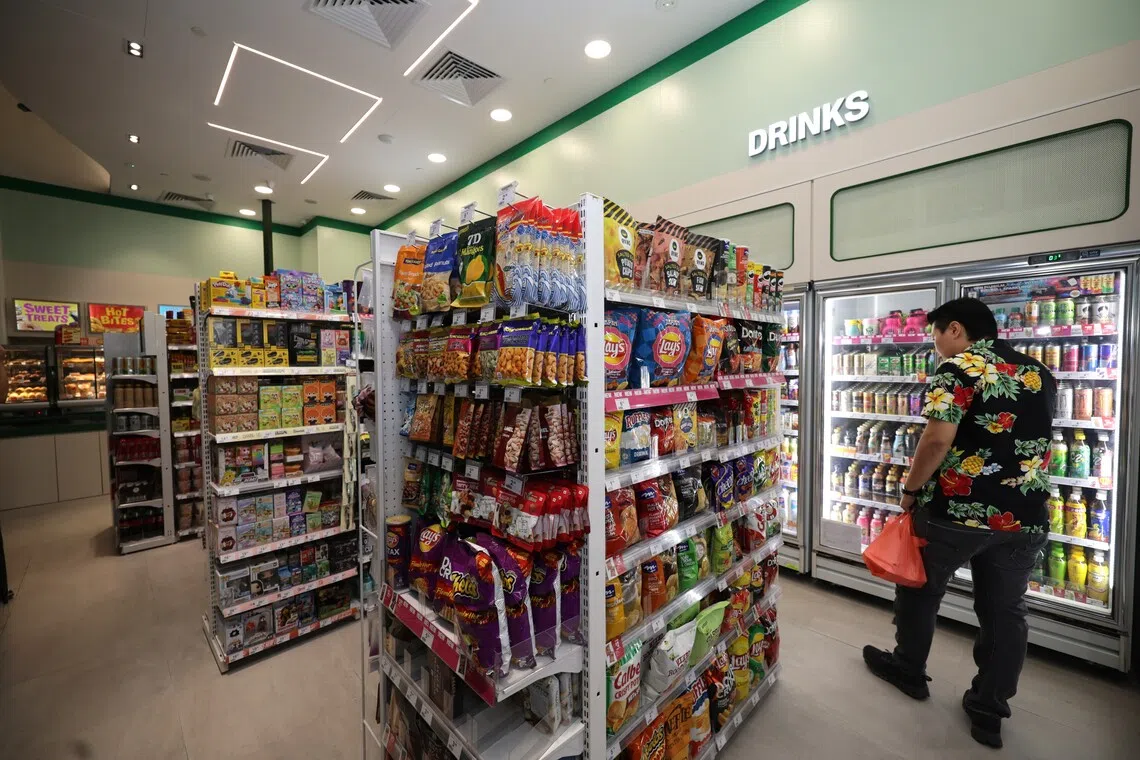7-Eleven carries out store revamps to redefine convenience shopping in Singapore
Sign up now: Get ST's newsletters delivered to your inbox
Follow topic:
SINGAPORE - Step into 7-Eleven’s CapitaSpring outlet and you will be greeted by a bright store interior, including a new standing table area to grab a quick bite. There is now a wider selection of hot food such as pies and toasties, and a smoothie machine where you can make fruit smoothies yourself.
When The Straits Times visited the outlet on Oct 31, office workers were seen visiting the convenience store to pick up food and smoothies for their lunch break.
The CapitaSpring outlet in the Central Business District is one of several redesigned 7-Eleven stores rolled out under the chain’s latest brand revamp as part of efforts to reshape how consumers view convenience amid intensifying competition.
“When you think of convenience stores in Japan or South Korea, it’s very exciting – there are a lot of new products, and they are very food-focused. That is where we’ve been trying to take the business,” said Ms Anushree Khosla, managing director of 7-Eleven Singapore.
She added: “As consumers, when we travel to another country, we want to see different products in the convenience stores of that country. I hope that Singapore’s 7-Eleven chain can also become a place of discovery like that.
“We hope to become a destination for great food and new and exciting products that you don’t get at the supermarkets or anywhere else in Singapore.”
The move also reflects 7-Eleven’s broader strategy to evolve beyond essentials and tap into lifestyle spending, as consumers seek experiences even in everyday purchases.
“In the past, people usually think of 7-Eleven as a last-mile destination when they need to quickly buy some Panadol or batteries... we want to become a place where people can try out new food, have fun with their friends, or just somewhere to sit down and have a meal,” said Ms Anushree.
Some of 7-Eleven’s revamped features include its drink-mixing station, where customers can purchase a cup of ice and mix their own drinks with the options available at the store, including both alcoholic and non-alcoholic drinks.
“We’ve seen drink-mixing being a popular trend on TikTok in South Korea and Japan’s convenience stores, and thought to bring it into Singapore, as people can make social media content out of it as well,” said Ms Anushree.
Blind boxes have also earned their place on a dedicated shelf in 7-Eleven stores, fuelled by the popularity of blind boxes in Singapore, said Ms Anushree.
Blind boxes are a type of collectible product sold in sealed, non-transparent packaging, meaning buyers don’t know exactly which item they’re getting until they open it. The concept started in Japan and became popular across Asia through brands like Pop Mart.

The CapitaSpring outlet in the Central Business District is one of several redesigned 7-Eleven stores rolled out under the chain’s latest brand revamp.
ST PHOTO: GIN TAY
Besides bringing in popular blind boxes, 7-Eleven is also offering blind box series that are exclusive to the convenience store chain, such as merchandise based on anime character Crayon Shinchan.
The strategy marks a shift from selling convenience to selling experience, as 7-Eleven experiments with food concepts, collectibles, and lifestyle touches to draw more customers into its stores.
At the same time, 7-Eleven is strengthening its core convenience appeal with a wider selection of hot, ready-to-eat fare such as toasties and pizza, alongside burgers, sandwiches, coffee and Slurpees.
To cater to Singaporean taste buds, 7-Eleven will offer new flavours that fit the Singaporean palate as well. One example is its mala onigiri, as locals love spicy food, said Ms Anushree.
Tables and chairs have also been added to some 7-Eleven stores, allowing customers to sit down and enjoy their meals if they choose to do so. If the store is too small, it will have a high table instead.
As at December 2025, the convenience store chain will have revamped over 50 stores. 7-Eleven aims to revamp at least another 50 stores in 2026. There are more than 460 7-Eleven outlets in Singapore.

A shopper waits as her smoothie is blended at a self-service smoothie machine in the 7-Eleven outlet at CapitaSpring on Oct 31.
ST PHOTO: GIN TAY
The revamp has boosted overall sales as well as demand for ready-to-eat items, said Ms Anushree.
She added: “We’ve received feedback from customers that they like that our stores now look more modern and like that they can now spend more time in the store with the new features.”
To stay competitive, 7-Eleven is on the constant lookout for changing trends.
“This means that we have to be quick to catch on to new trends, as trends come and go quickly,” she said, giving an example of 7-Eleven catching on to the Dubai chocolate bar trend and bringing the chocolate bars to Singapore in early 2025.
In February 2025, 7-Eleven also launched its mobile app in Singapore, allowing users to order and pay remotely for pickup at 7-Eleven stores in Singapore, buy discounted product bundles, and check stock levels of products. The app has been downloaded 250,000 times since its launch.
In Singapore, 7-Eleven is operated by DFI Retail Group, a member of the Jardine Matheson Group. Both are listed on the Singapore Exchange.

